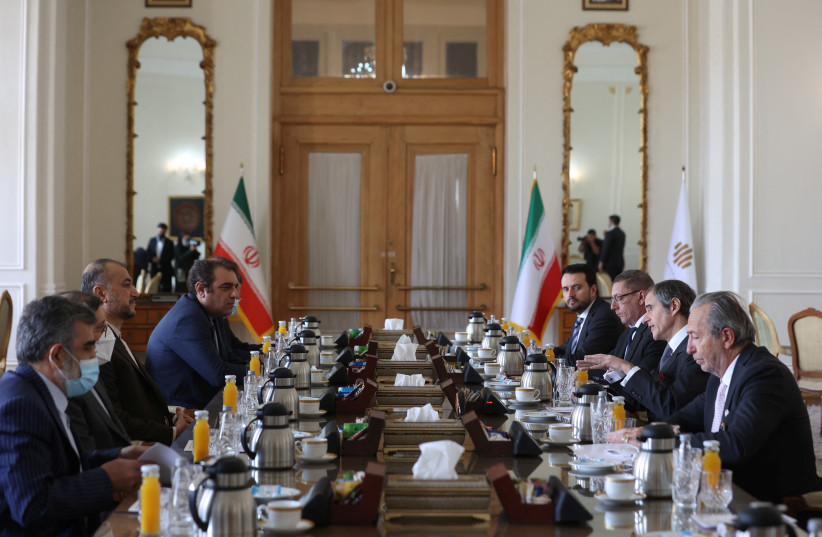A second deadline was missed on Sunday regarding a deal the International Atomic Energy Agency and Iran had said they agreed to in early March but that Tehran is now stonewalling.
According to a deal announced by both sides on March 5, Iran had been required to provide new answers to the IAEA by March 20 to try to talk its way out of evidence the Mossad had obtained in 2018 of the nuclear dimensions of its program.
However, the ayatollahs did not turn over their new answers on March 20 or since then, which led to missing the second deadline on Sunday.
Had Tehran sent its new answers, the IAEA was due on Sunday to already be demanding clarifications regarding them.
Moreover, the sides had agreed that they would start a series of physical meetings on April 10 to iron out any remaining differences after the first two rounds of exchange.

Yet, given that the exchange has not even started, there are no indications from the IAEA that the meetings, which had been scheduled for April 10, will take place.
This will leave the entire schedule agreed to on March 5 to be up to a month or more off track. It potentially leaves the entire process and the future of IAEA oversight of Iran’s nuclear program in jeopardy.
In the already legendary 2018 Mossad raid of Tehran’s secret nuclear archives, the spy agency provided to the world’s nuclear watchdog evidence that led it to discover four concealed nuclear sites and certain traces of illicit nuclear material.
Since then, Tehran has tried to drag its feet on any IAEA’s attempts to get explanations about the items it had been concealing.
But on March 5, the sides announced a dramatic deal in which the ayatollahs would finally provide more comprehensive responses to the IAEA’s questions in exchange for the nuclear inspectors ending their probe sometime around June.
At the time, most observers believed that this deal had been struck in parallel to an imminent return to the 2015 JCPOA nuclear deal between Iran and world powers.
Iran might not like to admit having concealed certain items, but it might finally be willing to do so, given guarantees that the JCPOA would be back in place.
However, the IAEA has gone dead silent on Iran now for several weeks.
In that light, it was unclear if Tehran had ignored the deadlines and if the IAEA-Iran deal might be unraveling due to delays in securing a return to the JCPOA.
It is possible that when Iran agreed to the IAEA deal on March 5 that it had not foreseen that last-minute moves by Russia would delay finalizing the JCPOA return by several weeks, being that Moscow only started to make noises about changes to the deal that same day.
Rather, both Iran and the IAEA probably viewed a deal closing the agency’s probes by late June as energizing the broader talks between Iran and the world powers.
IAEA Director-General Rafael Grossi arrived in Tehran for a dramatic visit on March 4 to discuss one of the last thorny issues blocking revival of the pact, which in return for a lifting of economic sanctions limited Iran’s enrichment of uranium, making it harder for Tehran to develop material for nuclear weapons.
At a second solo press conference on March 5, Grossi revealed that the IAEA was mostly dropping efforts to clarify what Iran had done with an illicit metal disc of nuclear material at one of the four nuclear sites in dispute.
“What we are looking for is not there,” he said. “There is no possibility for Iran to prove whether it was re-casted. We never close things. We have our assessment at this point in time. There is no point in continuing this because we are going to be leading nowhere.”
However, when pressed if he might close the probe into the three other nuclear sites based on a similar level of uncertainty, Grossi demurred.
“I don’t think so because of the nature of things,” he said. “A discrete and small amount of material is difficult to trace or impossible to trace back… what happened to it almost 20 years ago is completely different from the traces of enriched uranium at a place where no enriched uranium should have been found and information about [potentially illicit] equipment.”
“Without resolving these [outstanding] issues, efforts to revive the JCPOA may not be possible,” Grossi said earlier on March 5. But later in the day, he sounded an optimistic note about trends in talks with the Islamic Republic.
A major sticking point in the talks had been that Tehran wanted the question of uranium traces found at several old but undeclared sites in Iran to be closed. Western powers had said that is a separate matter to the deal, which the IAEA is not a party to.
